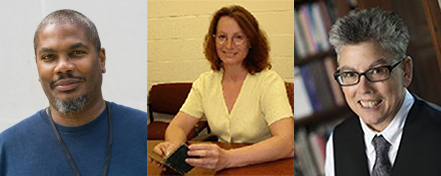
Professor David Soll, the Roy J. and Lucille Carver/Emil Witschi Professor of Biology and the director of the University of Iowa's Developmental Studies Hybridoma Bank (DSHB), is an internationally recognized leader in the study of molecular pathology and cell motility. But he and the DSHB board of advisors are passionate about an equally crucial area of higher education: the humanities.
The reason is simple: They believe that for scientists to do their best work,
they need the ethical grounding and communication skills that humanities education instills.
The Developmental Sciences Hybridoma Bank (DSHB) Awards provide support annually to tenured CLAS faculty for an approved research project within the humanities. The award is expected to result in at least one project for publication, or a national/ international presentation.
Awards are valued at $2,500, and may be used for professional travel, equipment, or other research needs. Funds must be spent within two years of receipt of the award.
By October 15, 2020, eligible faculty should complete this application and add a one-page narrative proposal. The complete application, along with a two-page CV, is sent to the DEO(s) for review and endorsement.
By November 1, 2020, if the DEO(s) endorses the proposal with a letter(s) of support, they sign the application and submit it along with the abbreviated CV as a single pdf to: Allison Bierman.
Applications are reviewed for approval by the CLAS Dean and Associate Deans. Please contact Allison Bierman (335-3994), CLAS Dean’s Office, with questions.
To ensure that aspiring scientists at the UI are learning from humanities professors at the forefront of research in their disciplines, DSHB funds the DSHB Faculty Scholar Awards for humanities researchers in the College of Liberal Arts and Sciences. CLAS administers the grants, including selecting the recipients from among applications. This year's recipients are Christopher Harris, Watraud Maierhofer, and Leslie Schwalm.
"We look at supporting UI humanities faculty as an investment in the future of science,” Soll said. “All scientists need the skills that the humanities teach in order to engage in forward-looking, ethical research and to communicate the relevance of their work to society. The UI has a uniquely strong foundation in the humanities, and we believe that those disciplines have a vital role to play in developing the broad-based perspectives that our science students will need to excel and have meaningful impact on their disciplines." The self-funded DSHB, an NIH National Resource housed in the UI Department of Biology, exists to facilitate biomedical research by providing monoclonal antibody samples to cancer researchers at a fraction of the cost of commercial markets.
The College of Liberal Arts and Sciences has announced the 2020-2022 class of DSHB Faculty Scholars, who are engaged in the type of innovative humanities research envisioned by the DSHB board of advisors:
Associate Professor Christopher Harris of the Department of Cinematic Arts will use the DSHB Faculty Scholar Award to continue work on Return Passage, an experimental documentary film project on the cultural representation of the Trans-Atlantic Slave Trade in West Africa. Harris describes the questions at the heart of his project: "As a descendent of enslaved Africans, I am keenly aware of the shared cultural inheritance of the African diaspora. Given this awareness, how is it that I have so little sense of the ways in which West Africans have confronted the enduring loss of loved ones to the Trans-Atlantic Slave Trade? How has their absence and that of their descendants made itself felt in west Africa? Is this absence perhaps more deeply felt than may be apparent, requiring an adjustment in perspective and cultural context for one to more clearly recognize its impact?" He will use the DSHB Award for a 10-day research trip to the Senegambia region of West Africa in order to consult with scholars and artists and to scout locations for the film.
Professor Waltraud Maierhofer of the Department of German will use the award to travel to Palermo, Italy, for the 2020 conference of the International Association of Germanic Studies. She will present on the representation of disabilities in German writing and film as part of a workshop that she has co-organized, and will edit a selection of the workshop's presentations into a book. Her presentation analyzes two recent German TV series where a woman with a disability is the protagonist: Dr. Klein, about a pediatrician who has dwarfism, and Heiland - We Are Attorney, about an attorney who was born blind. Both have been applauded by critics for their depiction of contemporary German society as diverse and inclusive, and Maierhofer will interview the writers for the programs. Her research and presentation will help shape the curriculum of her course "Disabilities in Global Writing and Film."
Professor Leslie Schwalm, chair of the Department of Gender, Women's, and Sexuality Studies with a joint appointment in the Department of History, will use her DSHB funding to present her research on embodied racism in the history of medicine at the 2020 meeting of the Organization of American Historians—the largest meeting of U.S. historians in the nation. Her research paper, “Last Rites/Lost Rights: Race, Research, and the Disposal of Human Remains during the Civil War,” documents the systemic impact of racism on wartime mortuary and burial practices. She illuminates the ways in which scholars have ignored the impact of racism and segregation on the disposal of the human remains of Black civilians and soldiers who sacrificed their lives during the Civil War. Bringing the question of whether, and how, race mattered in the treatment of war dead to her research in previously unexplored military records at the National Archives in Washington, D.C., Schwalm has identified clear patterns of pervasive differential treatment of Black human remains.